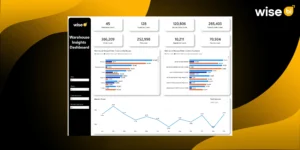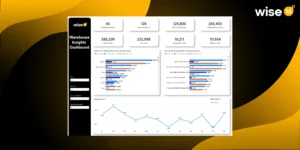The world of logistics and supply chain management is a complex web of interconnected processes and data. The ability to streamline operations, reduce costs, and improve visibility has never been more critical. This is where Business Intelligence (BI) emerges as a game-changer. The need for BI and how to choose the right BI solutions has become unavoidable in the business field. In this blog, we will explore how BI is harnessed in logistics to boost supply chain efficiency and visibility, providing organizations with a competitive edge in an ever-evolving market.
The Revolution of Logistics and Supply Chain
The logistics and supply chain landscape has evolved rapidly, fuelled by technological advancements, global trade, and changing consumer expectations. Today, logistics is not merely a support function but a strategic partner in driving business success. However, the complexities of managing an efficient and cost-effective supply chain have multiplied, and this is where BI takes center stage.
The goal of business intelligence, as its name implies, is to transform data into insightful knowledge that enables organizations to make wise decisions. In logistics, where data is generated continuously, business intelligence (BI) is essential to turning that data into useful information. The logistics sector has evolved to rely heavily on functions like data warehousing and Online Analytical Processing (OLAP) to help with efficiency and visibility.
The Impact of BI Solutions on Logistics Industries
Balancing Business Objectives
Optimizing business performance involves a delicate balancing act between various objectives, such as customer satisfaction and cost reduction. While no company can excel at everything, leveraging analytics can provide insights into customer behaviour and cost objectives. The role of BI in logistics and supply chain helps identify the sweet spot where it’s a win-win for both the business and its customers.
This level of awareness is a stepping stone to improving customer loyalty, enhancing brand reputation, and sharpening forecasting ability.
External Data Visibility
BI’s potential shines through when tapping into external data sources. The rise of the Internet of Things (IoT) has inundated the logistics arena with real-time data from sensors on devices, assets, and materials. Social media, often voluminous and unstructured, can impact product demand or even an entire brand with a single comment. Data from e-commerce systems offers insights into shopper behaviour, response to promotions, and competitive threats.
Business Intelligence facilitates the anticipation and response to external data, optimizing supply chain and logistics. The ability to provide end-to-end visibility across both external and internal data enables cost reduction, service improvement, and risk mitigation.
Managing Supply Chain Disruptions
The year 2020 showcased the vulnerability of global supply chains, causing disruptions that reverberated through businesses and consumers alike. Given that supply chains represent a significant portion of a business’s value, inefficient management can lead to a multitude of problems. BI tools integrated into decision-making processes enable real-time insights, allowing prompt responses to potential disruptions.
Visualizing demand, inventory, and distribution provides resilience and preparedness, mitigating the impact of disruptions.
Reduction of Labour Costs with Automated Reports
One of the most tangible benefits of implementing BI in logistics is the reduction of labour costs. BI tools can automate data extraction and reporting tasks, eliminating the need for manual labour. Auto-generated comprehensive reports on a daily, weekly, or monthly basis save time and resources, resulting in significant cost reductions.
Better Inventory Management and Higher Profitability
One of the main components of effective logistics is effective inventory management. Every piece of inventory represents a cost to the business, while shortages can lead to production delays and lost sales. BI tools enable organizations to monitor inventory, forecast demand, and optimize the ordering process.
Monitoring inventory flow allows for efficient demand forecasting and ordering process optimization. This, in turn, reduces costs and ensures a healthy cash flow.
The Path Forward
It is critical for organizations to leverage data in an era where technology provides the means for an intelligent supply chain. The increasing volume and variety of data necessitate a comprehensive approach to BI tools for individuals who are already utilizing them. Organizations that are able to recognize and utilize all of the tools and technologies at their disposal will have a competitive edge that will guarantee long-term growth and influence.
Conclusion
Business Intelligence has become an indispensable tool in the logistics and supply chain industry. Organizations may improve visibility, streamline processes, and beat out competitors by utilizing data. BI has become a critical ally for the logistics and supply chain management industry in a world where visibility and efficiency are the keys to success.
Business intelligence can help you in the future by enhancing supply chain visibility and efficiency as companies continue to negotiate the complicated logistics environment. The moment has arrived for logistics to fully utilize BI, ushering in a new era of supply chain efficiency and transparency.




